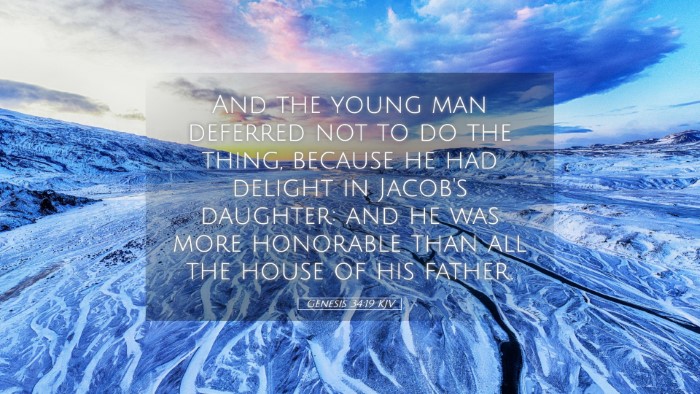Commentary on Genesis 34:19
Genesis 34:19 states: “And the young man deferred not to do the thing, because he had delight in Jacob’s daughter: and he was more honorable than all the house of his father.” This verse addresses the actions of Shechem, the son of Hamor the Hivite, relating to his desire for Dinah, the daughter of Jacob. This commentary synthesizes insights from notable public domain commentaries, offering a profound exploration for pastors, students, theologians, and Bible scholars.
Contextual Background
The narrative of Genesis 34 unfolds the story of Dinah's defilement, a traumatic event that sets off a chain of conflict. The chapter highlights the cultural dynamics and the gravitas of family honor in the ancient Near East.
The Cultural Setting
Understanding the context of Shechem's actions is critical. In the ancient Near East, relationships with women were often transactional, tied closely with family honor and social status. Matthew Henry’s commentary emphasizes that Shechem’s approach was driven by passion, leading him to act impulsively in the face of societal norms.
Analysis of Shechem’s Character
Albert Barnes offers an assessment of Shechem's character, noting that despite his honorable lineage, his actions toward Dinah were fundamentally flawed. He sought to fulfill his desires without regard for Dinah’s dignity or the implications of his actions on her family. His “delight” in Dinah can be viewed not only as romantic attraction but also as a selfish pursuit, displaying an immaturity often evident in passionate desire.
Interpretive Insights
In this verse, the term "more honorable" raises significant questions about Shechem’s motivations. Adam Clarke provides a nuanced interpretation, suggesting that Shechem's actions, though wrong, were perceived by him as noble in his pursuit of Dinah’s affection. This dichotomy in honor demonstrates how cultural expectations can distort a character's perception of righteousness.
The Nature of Honor and Dishonor
Honor in the biblical text does not always align with moral rectitude. Shechem’s honor, achievable through the act of taking Dinah as his wife, stands in sharp contrast to the honor expected by Jacob and his family. The subsequent actions of Dinah’s brothers, Simeon and Levi, who resorted to violence, reveal the complex layers of retribution and honor within the narrative.
Theological Reflections
This passage invites theological debate about the nature of desire and the morality of actions taken in its pursuit. Shechem deferred not to act when consumed by passion, showing that unchecked desire can lead to disastrous consequences. The ensuing family conflict frames a larger discourse on how societies navigate issues of honor, justice, and retribution. The consequences of Sin in Genesis 3 reverberate throughout, illustrating how a singular act can initiate spirals of sin and conflict.
God’s Sovereignty in Human Affairs
Despite the chaos that unfolds, God's sovereignty remains a central theme. The events of this chapter do not operate outside divine providence. Commentaries suggest that while humanity’s impact results in strife, God’s ultimate plan for redemption remains intact. This narrative foreshadows future reconciliations and the establishment of the Israelite identity.
Application for Today’s Reader
The analysis of Genesis 34:19 poses critical questions about desire, honor, and moral integrity that resonate today. Pastors can use these insights to counsel congregants on maintaining integrity in relationships. Scholars might explore the implications of cultural honor and how these concepts evolve within different societies.
Lessons in Ethical Relationships
- Understanding Desire: It is crucial to discern the motivations behind our desires and to ensure they align with the values of respect and dignity.
- The Cost of Honor: The pursuit of honor, when placed above ethical standards, can lead to turmoil within families and communities.
- Divine Sovereignty: Recognizing that, despite human failings, God remains sovereign helps believers trust in His plan amid personal and interpersonal conflicts.
Conclusion
The examination of Genesis 34:19 reveals the intricate balance of desire, honor, and ethical responsibility. By understanding the gravity of Shechem's actions in their cultural context, modern readers can glean valuable lessons on navigating relationships and seeking genuine honor through integrity rather than expedience. The insights from Matthew Henry, Albert Barnes, and Adam Clarke enrich this understanding, guiding readers toward deeper theological reflection and personal application.


